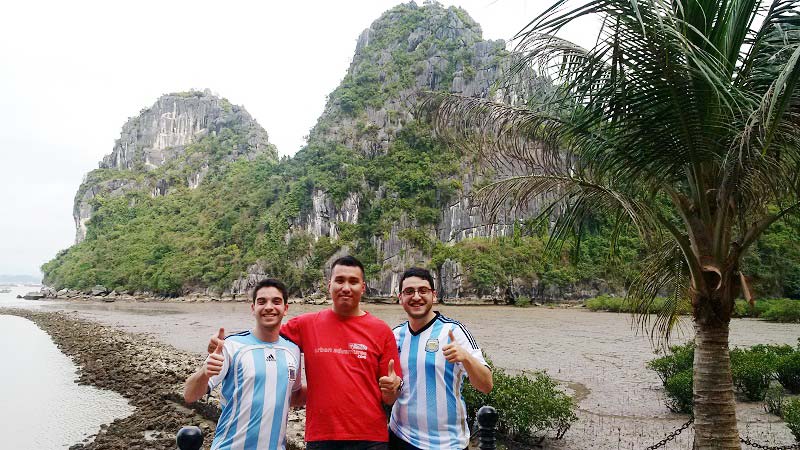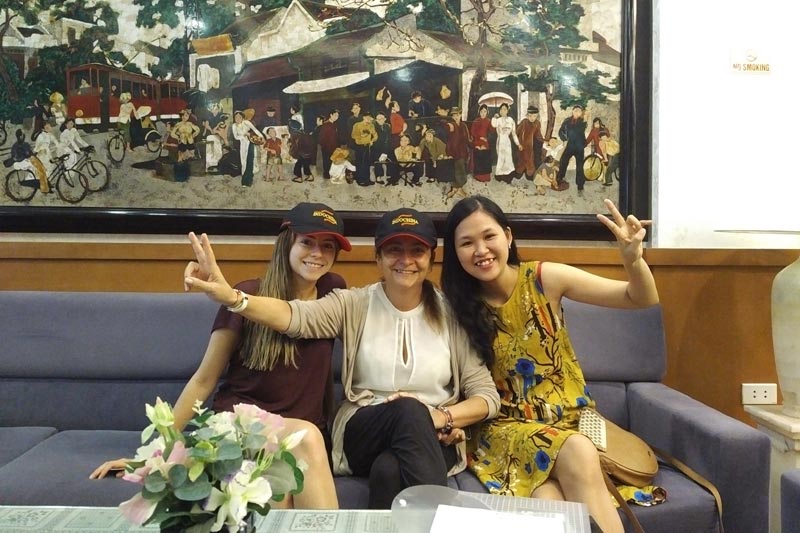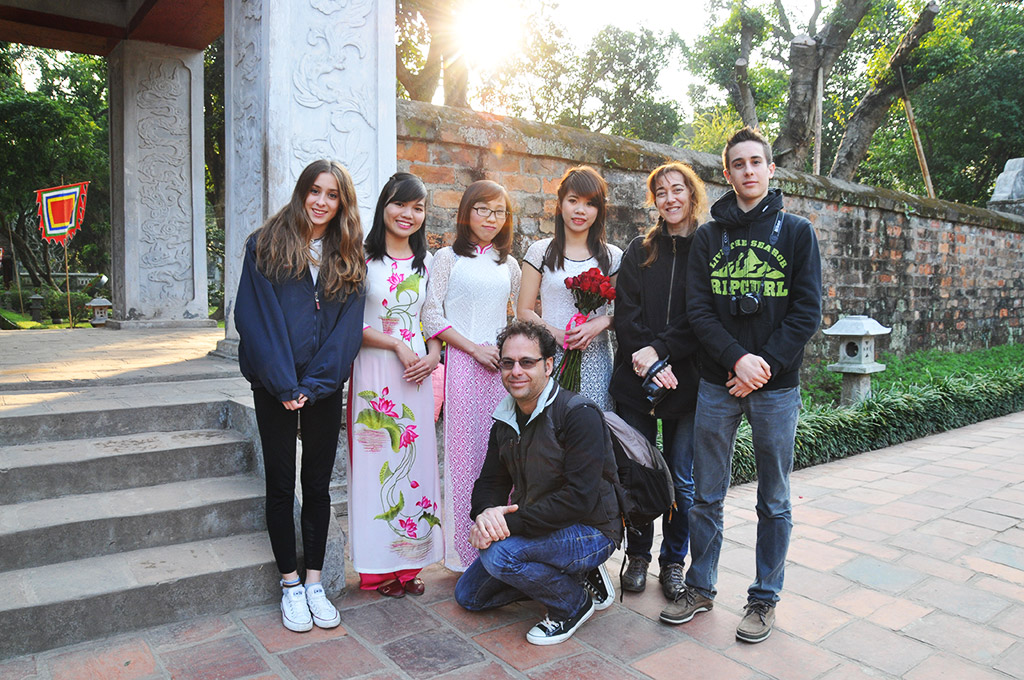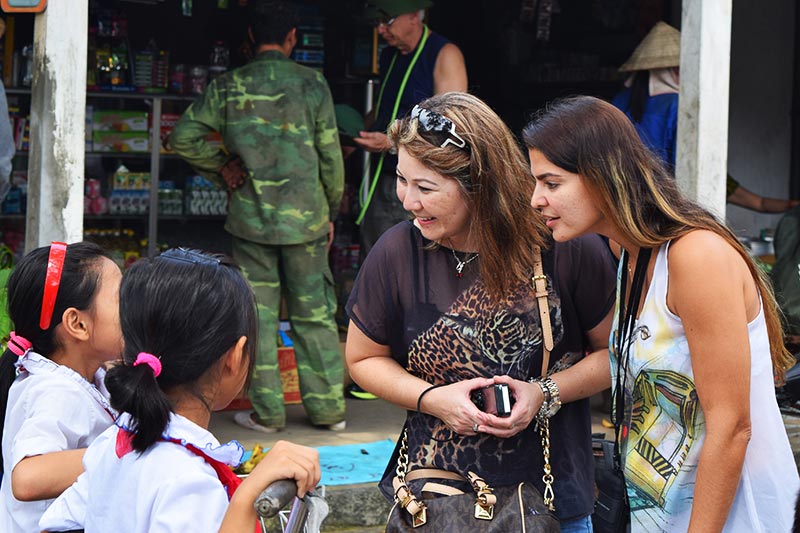- Call +84 981 237 915 Or Email
- info@nadovatours.com
How to communicate with Vietnamese people?
On your long Vietnam customized tour, there is a high chance that you will encounter a lot of locals there. “How to communicate with Vietnamese people?” – this question must strike you tons of time since you come from a different culture and do not know how to deal with the locals in an appropriate way. Don’t worry, Nadova Tours will help you out!

Vietnamese people and foreign tourists
On your long Vietnam customized tour, there is a high chance that you will encounter a lot of locals there. “How to communicate with Vietnamese people?” – this question must strike you tons of time since you come from a different culture and do not know how to deal with the locals in an appropriate way. Don’t worry, Nadova Tours will help you out!
Before coming into contact with the Vietnamese, it is essential that you be aware of their significant communication patterns as you can acknowledge how their communication style differs from yours and avoid misunderstandings.
Check out “How do Vietnamese people communicate with others? (1)” and “How do Vietnamese people communicate with others? (2)” to find out more.
After you have in hand necessary information about notable communications patterns of the Vietnamese, here are some dos and don’ts you should follow when communicating with them:
1. Do:
• Greet the Vietnamese in an appropriate way
It is common for foreigners to say “Hello” to the locals in a general way. However, to earn favorable impression of Vietnamese people, you should use their native language to greet them - say “Xin chào” with a broad smile. They will reciprocate with a broader one. Especially when you come from a different culture and the locals might hesitate to approach you, a friendly “Xin chào” is likely to diminish the difference and warm up the conversation.
However, you might be surprised to figure out the Vietnamese custom of saying hello. It is to add different pronouns to “xin chào”. For instance, if you are talking to someone who is older than you, say “em chào anh ạ" (hello brother) or “em chào chị ạ” (hello sister). There are a lot of pronouns that the Vietnamese add to their greetings to show respect to the elders and seniors. If you are not yet accustomed to using these pronouns, a slight bow to the elders is fine.
How to say Hello in Vietnam (source: colanguage.com)
| English | Vietnamese | When |
|---|---|---|
| Hello! | Xin chào | General and polite way of greeting when correct ending phrase is unknown |
| Chào bạn! | Informal way of greeting someone of either gender but the same age | |
| Chào anh (+ first name)! | Greeting a male person of the same age or who is older than you | |
| Chào chị (+ first name)! | Greeting a female person that is older than you | |
| Chào em (/first name)! | Greeting someone that is definitely younger than you |
• Make efforts to keep the conversations harmonious and balanced
After a proper greeting, the next thing you should do is to strike up a conversation with the Vietnamese. In maintaining that conversation, you should put an effort into keeping it going on harmoniously and smoothly. Why? Because the Vietnamese tend to value harmony and avoid conflicts, as can be inferred from “How do Vietnamese people communicate with others? (1)”.
In order to facilitate that, a smile might do you a favor as it can be interpreted as a sign of good will and friendliness. Besides, if you have good sense of humor, you should take advantage of that because Vietnamese people love talking to someone who is humorous. Funny jokes can also be used as a way to break the ice between two strangers when they first meet.
• Pay respect if you are talking to the elders
One significant trait of Vietnamese people you should be aware of is that they put strong emphasis on respect. They express it in many different ways towards the elders and seniors – a wide range of pronouns they use to address others; simple non-verbal expressions like a slight bow, avoiding eye contact, etc.
Therefore, if you are talking to someone who is a lot older than you, it is recommended that you treat them with deference. Remember to use honorifics (Mr., Mrs.) to address them if you are not used to Vietnamese pronouns.
You should also use respectful gestures like bowing slightly or placing your left hand on the inside of the elbow when shaking hands with the elders. Flippant gestures like putting your hands over others’ shoulders – which is commonly used among friends, should be avoided.
• Pay respect to Vietnam and its culture
It is a common sense that you should pay respect to any country that you are visiting. Especially when you are on your long Vietnam customized tour and intend to acquaint yourself with the locals, that fact is of greater importance. Why? Because Vietnamese people are well-known for their high national pride.
In order not to offend the Vietnamese, you should be tactful when expressing your attitude towards Vietnam and its culture. If you have any dissatisfaction over their country, it is advisable that you avoid direct criticism.
Pay respect to the people and culture when travelling to Vietnam
2. Don’t:
• Be offended if your Vietnamese partner does not mean what she or he says
If you spend some time diving into significant traits of Vietnamese people, you might find out that they have a preference for indirect communication style. Not only Vietnamese but also people from other Asian countries – namely: Japan, Korean, Chinese, etc. share the same characteristic.
One popular example illustrating this point is the Vietnamese’s “yes” and “no”. As Vietnamese people would love to avoid conflicts, they are inclined to answer “yes” to every questions and proposals while not totally in agreement with them. This is considered as an act of politeness in Vietnam since a direct “No” or refusal, in their point of view, might hurt their partners’ feelings and cause them to lose face.
On your Vietnam private tour, there are chances that you might encounter a situation where you see a Vietnamese politely agree with you but then find out that he or she does not share the same opinion. In this case, don’t take offence because they shall not harbor any bad intentions, it is just that the way they convey their attitude is different from yours.
• Criticize someone directly and publicly
As the concept of “face”- which indicates one’s reputation, honor and dignity, is important in Vietnam, arguments or direct criticism do not usually take place in this country. Most Vietnamese people are sensitive to criticism and as a result, they also avoid criticizing others directly.
Therefore, if you intend to debate with someone in Vietnam, handle it with tact. You should avoid harsh words or direct disapproval since it might cause harm to his or her dignity. This tip is especially important if you have in mind an intention to establish and maintain relationship with the locals on your Vietnam customized holiday. Acknowledging this trait can help your relationship proceed more easily and smoothly.
 Avoid direct criticism when talking to the Vietnamese
Avoid direct criticism when talking to the Vietnamese
Related articles:
What is the attitude of the Vietnamese towards foreign tourists?
How to leave good impression on Vietnamese people?
How to establish and maintain relationship with Vietnamese people? (1)
How to establish and maintain relationship with Vietnamese people? (2)
View tour: Absolute Vietnam Holidays 15 days
Who are the locals that you might come into contact with?
They can be anyone: Your native tour guide, a passer-by enjoying their food right beside you or someone you encounter on the street. Talking with them might gain you deeper understanding about this country beyond what is written in the travel guide or on the internet - their culture and other notable characteristics. Not to mention it can also gain you a new cross-culture friend as well as a chance to enrich your knowledge and widen your perspective. So if you want to take advantage of this chance, you should follow below tips to make it work on your first impression!
How to leave good impression on Vietnamese people?
If you want to leave a good impression on Vietnamese people, there are certain things that you should pay attention to:
1. Social etiquette
When you encounter a Vietnamese, before a proper greeting, the first impression you might leave on them is your appearance and behaviors. Therefore, it is advisable that you acknowledge cultural differences in social etiquette and follow below tips to earn favorable impressions of the Vietnamese.
Do:
• Wear decent and conservative clothing
• Express positive attitude
• Give or take things by your two hands.
• Show your respect to the old, children and the disabled people, especially on bus by offering your seat to them.
Don’t:
• Wear revealing clothes: this is considered inappropriate dress code, especially for women in Vietnam.
• Flaunt wealth in public as this is viewed as impolite
• Lose your temper in public: Expression of anger and aggression are viewed as sign of weakness by Vietnamese standard.
• Show affection in public: While kissing or hugging your partner might be acceptable in big cities like Hanoi or Ho Chi Minh city, it is social taboo elsewhere.

Wear decent clothes when visiting Vietnam
2. Greetings
Now that you have a chance to approach the locals and say “hello” to them. There comes a question: “How to do it appropriately?” There are some do’s and do not’s you need to be aware of:
Do:
• Say “Hello” in Vietnamese – “Xin chao”: When greeting a Vietnamese, you should say "hello" in their language - "xin chao". They will very much appreciate that because you are using their language to greet them. However, "xin chao" is just a general way to greet someone in Vietnam. If you are adapted to Vietnamese custom, you would be surprised to find out the appropriate way to say "hello" in their language. It is to add different pronouns to "xin chao", which is illustrated more clearly in the table below.
• Smile broadly: Give Vietnamese people a broad smile and they will reciprocate with a broader one. Especially when you come from a total different culture - which might defer the locals from approaching you, a generous smile will diminish the differences and bring you guys closer.
• Pay respect if you are talking to the elders: If you are not accustomed to using the same way as the Vietnamese to address the elders, a slight bow might be fine for you.
Don’t:
• Be engaged in physical contact with the opposite sex: The personal distance at which Vietnamese people feel comfortable is much larger than in almost Western countries. As a result, they rarely touch the ones who are not close to them, especially those of opposite sex. When greeting, it is advisable that you shake hands with the locals to express your friendly attitude.
How to say Hello in Vietnam (source: colanguage.com)
| English | Vietnamese | When |
|---|---|---|
| Hello! | Xin chào | General and polite way of greeting when correct ending phrase is unknown |
| Chào bạn! | Informal way of greeting someone of either gender but the same age | |
| Chào anh (+ first name)! | Greeting a male person of the same age or who is older than you | |
| Chào chị (+ first name)! | Greeting a female person that is older than you | |
| Chào em (/first name)! | Greeting someone that is definitely younger than you |
3. Strike up a conversation
What to do next after a proper greeting? In your first meeting with the locals, you are just a stranger from a different culture to them. It might take a little time for them to warm up to you and vice versa. To keep the conversations going smoothly, here are some tips you can do to break the ice:
Do:
• Introduce about yourself: It is an essential part of the conversation among strangers, especially if you have an intention to get closer to someone. A brief introduction with information regarding your name, background and hobby will give a Vietnamese chance to know more about you.
• Seek a suitable topic to engage the Vietnamese in: Mentioning noteworthy characteristics of your country is a good topic to prolong the conversation. Both you and your Vietnamese partner might find it interesting to explore cultural differences between the two countries.
• Joke around: As Vietnamese people favor humor and storytelling, they would love to talk to someone with great sense of humor. Therefore, if you are good at telling jokes, you should take advantage of this strong point. However, you should pay attention to their reaction since humor sense differs from culture to culture. Remember to make explanation when needed.
Don’t:
• Boast about yourself: As mentioned in “How do Vietnamese people communicate with others? (1)”, Vietnamese people value modesty and self-restraint. Therefore, if you have a high self-esteem, you should avoid showing off during your conversations.
• Talk about politics or history: Be careful when broadening the subjects in your conversation with the Vietnamese. Politics and wars are sensitive topics that should be approached with tact, or else, they should be avoided
• Criticize or point out someone’s mistakes as this can cause to a Vietnamese to lose face.

Try holding a conversation with Vietnamese people
Creating a good impression is always essential wherever you go. Especially when you visit another country and have the chance to meet people from a total different culture, that fact is of greater importance. That is why you should have in hand basic knowledge about the social etiquette as well as some tips to greet Vietnamese people and to hold a conversation with them in an appropriate way - which has been provide by Nadova Tours via this article. Try applying these tips - saying hello or striking up a small talk with the locals you encounter on your long Vietnam customized holiday, you will find out how intriguing and refreshing it is!
Related articles
How do Vietnamese people communicate with others? (1)
How do Vietnamese people communicate with others? (2)
What is the attitude of Vietnamese people towards foreign tourists?
How to establish and maintain relationship with Vietnamese people? (1)
How to establish and maintain relationship with Vietnamese people? (2)
View tour:
Do:
- Wear decent and conservative clothing
- Express positive attitude
- Give or take things by your two hands.
- Show your respect to the old, children and the disabled people, especially on bus by offering your seat to them.
Don’t:
- Wear revealing clothes: this is considered inappropriate dress code, especially for women in Vietnam.
- Flaunt wealth in public as this is viewed as impolite
- Lose your temper in public: Expression of anger and aggression are viewed as sign of weaknessby Vietnamese standard.
- Show affection in public: While kissing or hugging your partner might be acceptable in big cities like Hanoi or Ho Chi Minh city, it is social taboo elsewhere.
Recent Posts
- Travel to Vietnam from Mexico: Everything You Should Know
- Travel to Vietnam from Argentina: Everything You Should Know
- Ultimate First-Timer’s Guide to Vietnam: Essential Tips You Must Know Before You Go
- 10 Compelling Reasons Why Vietnam Will Be Southeast Asia’s Top Travel Destination in 2026
- Travel to Vietnam from Australia: Everything You Should Know
Recent articles
- Travel to Vietnam from Mexico: Everything You Should Know
- Travel to Vietnam from Argentina: Everything You Should Know
- Ultimate First-Timer’s Guide to Vietnam: Essential Tips You Must Know Before You Go
- 10 Compelling Reasons Why Vietnam Will Be Southeast Asia’s Top Travel Destination in 2026
- Travel to Vietnam from Australia: Everything You Should Know
- Chasing the Winter Sun: The Best Beaches to Visit in Vietnam This December
- Hoa Lo Prison – A Glimpse into Hanoi’s Living History
- Cu Chi Tunnels: Step Inside Vietnam’s Underground World
- Main Principles of Vietnamese Food You Should Know
- Is It Safe to Travel to Vietnam in 2025? A Complete Safety Guide for Travelers
Tags
Support Online

Being the locals, we know the true value of our land. We always listen and arrange everything as your desire. Please kindly send us whatever about your trip, we will send you best offers quickly.





